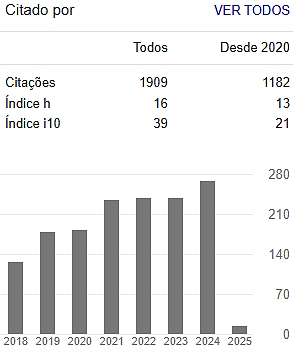OS CLUBES DE CIÊNCIAS COMO CONTEXTOS DE FORMAÇÃO INICIAL DOCENTE: CONTRIBUIÇÕES A PARTIR DA PRODUÇÃO CIENTÍFICA DE UM COLETIVO PIBID
Keywords:
Teacher Education, PIBID, Educational practices, Science Clubs.Abstract
This research is developed in order to articulate understandings about the initial formation of teachers in contexts of Non-Formal Education, the Science Clubs. Between the years 2014 to 2017, a group of scholarship holders from the Institutional Scholarship Program for Teaching Initiation, shared teaching experiences in Science Clubs and in their recorded path about their educational practices, disseminating them in publications. Therefore, we aim to elucidate, based on an analysis of the scientific production developed by this group about educational practices in Science Clubs, contributions to the training of teachers. For this, we carried out a bibliographic research, with a study of the scientific production of this collective and the interpretation of the data, considering a priori categories elaborated from the "five focuses of teacher learning" and "five positions for teacher training". 65 works were inventoried and worked, disseminated at local, national and one international events. Its analysis in the budgets interpret that the PIBID movement, in university-school relations, strengthened Science Clubs to become spaces with formative power, enabling undergraduate students experiences that mobilized the preparation of practical teaching knowledge (pedagogical composition) and its reflection (investigative recompositing); the interest in teaching (personal disposition), the cultivation of belonging to the teaching community and the development of the teaching identity (professional interposition) in articulations of Non Formal Education and the school.
Downloads
References
CAPES - COORDENAÇÃO DE APERFEIÇOAMENTO DE PESSOAL DE NÍVEL SUPERIOR. Regulamento do Programa Institucional de bolsa de iniciação à Docência. Portaria nº 096, de 18 de Julho de 2013, 24p.
CASTRO, Fernanda Rabello de. Há sentido na educação não formal na perspectiva da formação integral? Museologia & Interdisciplinaridade, Brasília, v. 4, n. 8, dez. 2015.
GOHN, Maria da Glória. Educação Não Formal e o educador social: Atuação no desenvolvimento de projetos sociais. São Paulo: Cortez, 2010.
LIMA, M. C. Monografia: a engenharia da produção acadêmica. 2. ed. São Paulo: Saraiva, 2008.
MARCELO, Carlos. Desenvolvimento profissional docente: passado e futuro. Sísifo - Revista de Ciência da Educação, Lisboa3, p.7-22, jan./ fev./ mar./ abr. 2009.
NÓVOA, A. S. Professores: Imagens do futuro presente. Lisboa: Educa, 2009.
________, A. Firmar a posição como professor, afirmar a profissão docente. Cadernos de Pesquisa, São Paulo, v.47 n.166 p.1106-1133 out./dez. 2017.
XXXXXX XXXXX, 2014.
XXXXX; XXXXXX; XXXXX, 2015.
XXXXXX et al, 2016.
XXXX; XXXXX, 2019.
SANTOS, A. R. Metodologia Científica: a construção do conhecimento. 3. ed. Rio de Janeiro: DP&A Editora, 2000.
ZUCCHETTI, D. T. Resenha. Educação, Porto Alegre, v. 35, n. 1, p. 137-138, jan./abr. 2012.

